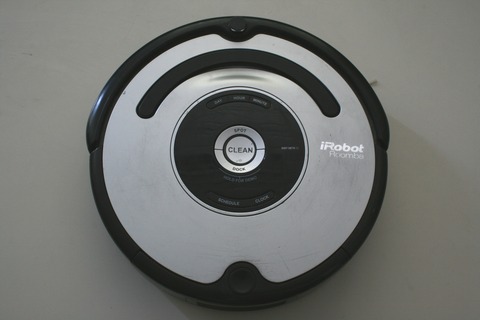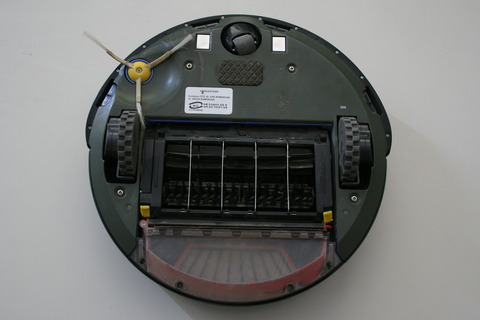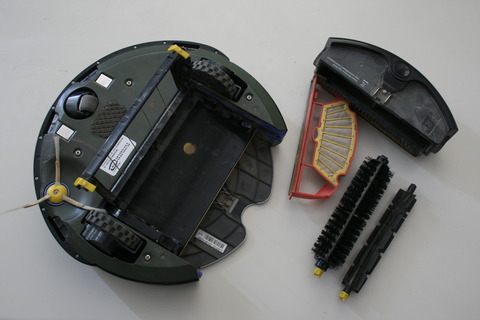Difference between revisions of "Disassembling a Roomba 560"
m |
m (→Before dissection) |
||
| Line 10: | Line 10: | ||
Image:Roomba_1.JPG | Top view. It shows the control panel and little more (on the top you can see the omnidirectional sensor and the bumper, but there's not much to note). | Image:Roomba_1.JPG | Top view. It shows the control panel and little more (on the top you can see the omnidirectional sensor and the bumper, but there's not much to note). | ||
Image:Roomba_2.JPG | Bottom view. This is more interesting, as you can see (almost) all the moving parts, i.e., the two actuated wheels (bigger), the idler wheel (on top), the two rotating brushes, and the side brush used to catch dirt from corners. The "almost" is due to the fact that the Roomba also sports a small fan in the dust compartment (the only real vacuuming action occurs there) and a motor that lifts the whole brush module when the robot is on a carpet. | Image:Roomba_2.JPG | Bottom view. This is more interesting, as you can see (almost) all the moving parts, i.e., the two actuated wheels (bigger), the idler wheel (on top), the two rotating brushes, and the side brush used to catch dirt from corners. The "almost" is due to the fact that the Roomba also sports a small fan in the dust compartment (the only real vacuuming action occurs there) and a motor that lifts the whole brush module when the robot is on a carpet. | ||
| − | Image:Roomba_3.JPG | The elements of the Roomba which can be removed when the robot has to be cleaned: two rotating brushes and the dust compartment. The latter includes a small fan, which receives power from the two clamp-like contacts visible on the underside of the robot, and a red element (shown in its open position) supporting a dust filter. | + | Image:Roomba_3.JPG | The elements of the Roomba which can be removed when the robot has to be cleaned: two rotating brushes and the dust compartment. The latter includes a small fan, which receives power from the two clamp-like contacts visible on the underside of the robot, and a red element (shown in its open position by the picture) supporting a dust filter. |
</gallery> | </gallery> | ||
Revision as of 14:00, 10 March 2010
This page is dedicated to the disassembly of a Roomba 560 vacuuming robot. Its purpose is to provide AIRLab users (or anyone else) wanting to hack a Roomba with a guide to the process, so that they can plan their work easily. Other Roomba 500-series models should be similar to the one featured in this page.
Please note that the robot we have taken apart was well-used, so you will see a fair bit of dust and dirt on the parts... all for the sake of realism. (Just joking: simply, that was a broken robot we could spare in case the process proved to be fatal :-) )
If you click on any of the images below, you will be taken to its own AIRWiki page, where you will be able to download the file. However, the files are NOT high-resolution (480x320 pixels: on this page they are shown at full resolution). You can download the high-resolution originals of the images (and some additional image not shown by this AIRWiki page) from here. Note that the originals are 3888x2592 pixels, and each of them weighs in at 3-5MB.
Before dissection
Here you can see the Roomba 560 before any disassembling occurred.
Bottom view. This is more interesting, as you can see (almost) all the moving parts, i.e., the two actuated wheels (bigger), the idler wheel (on top), the two rotating brushes, and the side brush used to catch dirt from corners. The "almost" is due to the fact that the Roomba also sports a small fan in the dust compartment (the only real vacuuming action occurs there) and a motor that lifts the whole brush module when the robot is on a carpet.
The elements of the Roomba which can be removed when the robot has to be cleaned: two rotating brushes and the dust compartment. The latter includes a small fan, which receives power from the two clamp-like contacts visible on the underside of the robot, and a red element (shown in its open position by the picture) supporting a dust filter.


